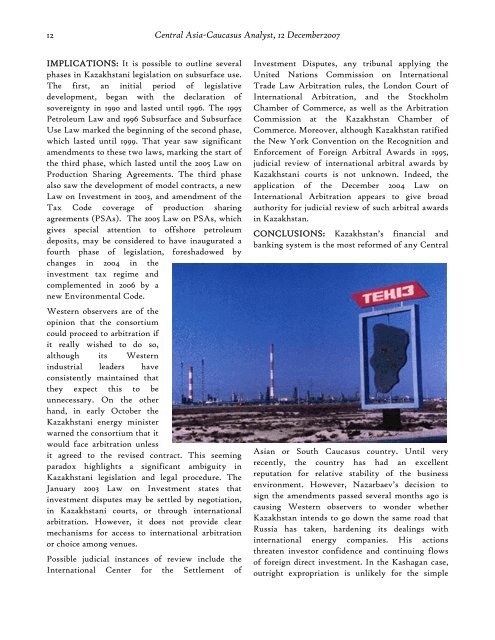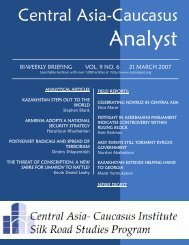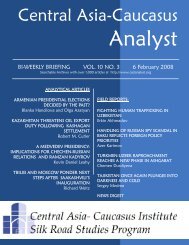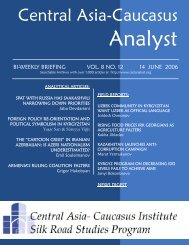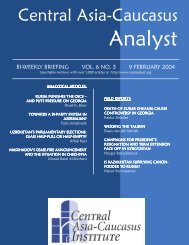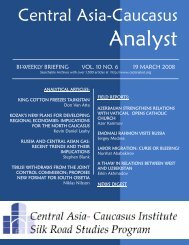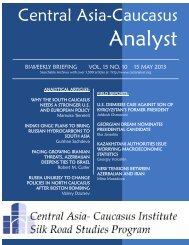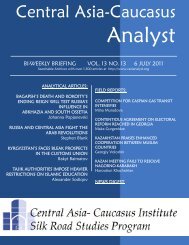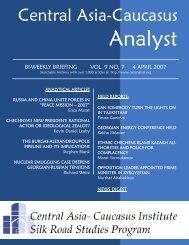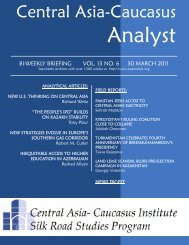Johanna Popjanevski - The Central Asia-Caucasus Analyst
Johanna Popjanevski - The Central Asia-Caucasus Analyst
Johanna Popjanevski - The Central Asia-Caucasus Analyst
You also want an ePaper? Increase the reach of your titles
YUMPU automatically turns print PDFs into web optimized ePapers that Google loves.
12<strong>Central</strong> <strong>Asia</strong>-<strong>Caucasus</strong> <strong>Analyst</strong>, 12 December2007IMPLICATIONS: It is possible to outline severalphases in Kazakhstani legislation on subsurface use.<strong>The</strong> first, an initial period of legislativedevelopment, began with the declaration ofsovereignty in 1990 and lasted until 1996. <strong>The</strong> 1995Petroleum Law and 1996 Subsurface and SubsurfaceUse Law marked the beginning of the second phase,which lasted until 1999. That year saw significantamendments to these two laws, marking the start ofthe third phase, which lasted until the 2005 Law onProduction Sharing Agreements. <strong>The</strong> third phasealso saw the development of model contracts, a newLaw on Investment in 2003, and amendment of theTax Code coverage of production sharingagreements (PSAs). <strong>The</strong> 2005 Law on PSAs, whichgives special attention to offshore petroleumdeposits, may be considered to have inaugurated afourth phase of legislation, foreshadowed bychanges in 2004 in theinvestment tax regime andcomplemented in 2006 by anew Environmental Code.Western observers are of theopinion that the consortiumcould proceed to arbitration ifit really wished to do so,although its Westernindustrial leaders haveconsistently maintained thatthey expect this to beunnecessary. On the otherhand, in early October theKazakhstani energy ministerwarned the consortium that itwould face arbitration unlessit agreed to the revised contract. This seemingparadox highlights a significant ambiguity inKazakhstani legislation and legal procedure. <strong>The</strong>January 2003 Law on Investment states thatinvestment disputes may be settled by negotiation,in Kazakhstani courts, or through internationalarbitration. However, it does not provide clearmechanisms for access to international arbitrationor choice among venues.Possible judicial instances of review include theInternational Center for the Settlement ofInvestment Disputes, any tribunal applying theUnited Nations Commission on InternationalTrade Law Arbitration rules, the London Court ofInternational Arbitration, and the StockholmChamber of Commerce, as well as the ArbitrationCommission at the Kazakhstan Chamber ofCommerce. Moreover, although Kazakhstan ratifiedthe New York Convention on the Recognition andEnforcement of Foreign Arbitral Awards in 1995,judicial review of international arbitral awards byKazakhstani courts is not unknown. Indeed, theapplication of the December 2004 Law onInternational Arbitration appears to give broadauthority for judicial review of such arbitral awardsin Kazakhstan.CONCLUSIONS: Kazakhstan’s financial andbanking system is the most reformed of any <strong>Central</strong><strong>Asia</strong>n or South <strong>Caucasus</strong> country. Until veryrecently, the country has had an excellentreputation for relative stability of the businessenvironment. However, Nazarbaev’s decision tosign the amendments passed several months ago iscausing Western observers to wonder whetherKazakhstan intends to go down the same road thatRussia has taken, hardening its dealings withinternational energy companies. His actionsthreaten investor confidence and continuing flowsof foreign direct investment. In the Kashagan case,outright expropriation is unlikely for the simple


